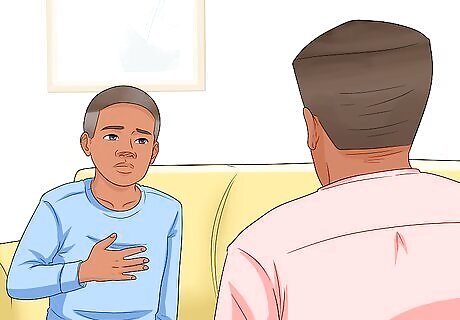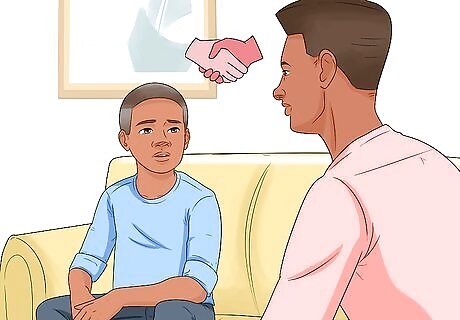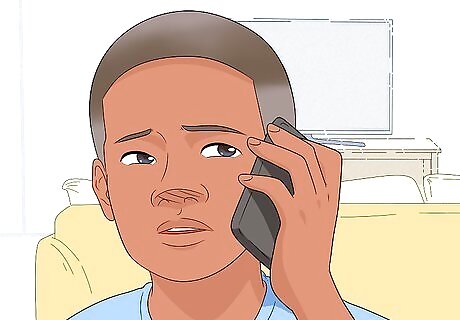
views
Keeping Cool While Listening Closely

Breathe. Try to pay attention to how your body feels while you're being yelled at, with mindfulness. Chances are you are feeling tense and tightly wound. If this is the case, taking deep, measured breaths will help you remain calmer and looser. Breathe in for at least four beats and out for as long as you can. Make sure that the air you take in travels all the way down to your belly and makes your abdomen expand.

Understand that yelling is not eternal. It may seem like your parents are yelling for two or three hours, but if you look at the clock, you will see that very few parents have the stamina to do so. Eventually, they will stop. Tell yourself that you're strong enough to endure the yelling. Many kids have to deal with yelling parents at least sometimes.

Try not to interrupt. It may be hard to stay calm while you’re being yelled at, but if you speak, your parents may take it as backtalk or rudeness, even if your words are polite. They may also be in a bad mood in general and taking it out on you, even if you did nothing to make them yell.

Let yourself disengage a little. Sometimes detaching from harsh treatment is a good way to make sure that you don't take the yelling too personally. It's important not to take yelling personally because when parents are dealing with problems in other parts of life, they can end up angered by relatively minor things. This is not your fault. The best way to disengage while listening is to focus on your parents' faces. Notice the details of their features and the strain from yelling. Rather than trying to make sense of what your parent is saying, look at the desperation and frustration you see them experiencing. This way you will remember that even though you're the one being yelled at, your parents are going through a rough moment, too. Again, this may even be due to stress that you did not directly cause.

Do a good deed for your parents. For example, get them a glass of water if they are thirsty. This will, especially if you were not wrong, bring them to be remorseful and feel that they have done wrong by yelling.

Keep listening. Make sure you don't have your head in the clouds completely—otherwise you won't know why your parents are upset. If the yelling subsides for long enough to step in, try paraphrasing or restating what your parents said to show that you are listening. An added perk is that your parents will have the chance to hear what they are yelling reflected back to them. Send signals to your parent that you are hearing them, like nodding your head, raising your eyebrows, saying "I see what you mean by that". Try to pick up on key words that will clue you in to where your parents' disappointment is coming from. If they're yelling about a particular instance, try to pick up on details that they seem to dwell on. If it's a long stream of moments, try to pick out the theme the runs through them.

Think before responding. This includes stopping yourself from yelling back, throwing things, or slamming doors. Be aware that strong reactions on your part will simply escalate the tension and cause the yelling to continue and perhaps even grow in intensity. Your parent is angry for one reason or another, even if he/she is wrong in doing so, and the yelling is a sign of frustration and a desire to be heard by you. Responding with aggression will make them feel misunderstood, so more yelling will be likely in the future. Sometimes parents even take subtle signs of dissent as aggression (rolling your eyes, sarcasm, slightly mocking faces). So, these should also be reconsidered. Think about the reactions that you know from past experience that your parents can't stand. Even if you're tempted to get back at them for making you feel uncomfortable and inferior, do not engage in behavior you know triggers more anger in them.

Leave the room politely if yelling seems excessive. If the yelling continues to the point where you absolutely cannot respond calmly, resort to leaving the room. Ask if you can talk about the problem later, and briefly explain that the yelling is making it difficult to think clearly about the issue. Try not to sound accusatory by saying things like "your yelling is so annoying that it's driving me crazy." Instead, say something like "I want to clear up this problem, but I'm too flustered to be able to have a good discussion. I'd like to go to my room to think." Leaving the room can be difficult, as some parents may interpret it as a sign of disrespect. Do your best to make it clear that you still want to discuss the matter. Avoid suggesting that your parents need to calm down as well. This can come off as rude.
Responding to Avoid Future Yelling

Do not apologize if you were not wrong. Stand your ground. If you apologize when you are not wrong, you would be doing yourself an injustice. If you know that you are not wrong but still feel remorseful for infuriating your parent, it is, in most situations, acceptable to say, "Mom/Dad, I am sorry you were angry and hope that you will feel better very soon." It can help to make a plan to release any lingering aggression by doing something active once you are able. For example, you could clean your room or go for a jog in the neighborhood.

Respond. Keep your responses simple, polite and in a measured tone of voice. Don't allow any sarcasm or anger to come out in how you sound because your parents might think that you are being resistant or passive aggressive. Also, avoid trying to give your opinion or account of what happened during the yelling. You can always do that when you are all calm. Instead, try using a simple affirmative statement, like "I understand" or "I see". It's okay if you don't agree with or completely understand what your parents are saying. These are things to talk about once everyone is calm enough to be able to express themselves kindly.

Accept your parents' feelings. Be sure to let your parents know that you can see that they're upset about whatever you did. Even if you do not feel at fault for whatever it is, do not fight about the fact that your parents are upset. Whatever the facts are, acknowledging your parents' feelings does not mean conceding that they are right or wrong. Apologize if you were wrong. Be sincere. If you were wrong, expressing repentance for what you did is a good thing to do.

Seek a compromise. Ask your parents what you can do to improve the situation. However, remember to stand your ground if you were right! It's possible that you can enact a quick fix to make sure that your parents don't stay in sour moods that might make them more likely to yell about other things. The more you can resolve about the incident, the better. If you still have thoughts to express beyond what you think your parents will understand, write it down! It is important to clear lingering anger so that you don't snap unexpectedly at the parent later on.

Discuss your feelings. Once you and your parents have cooled off a little, try bringing your side of the story to light. In a clear and respectful tone, tell your parents why you did what you did. The better you can explain your thoughts and feelings at the time(s) of the incident(s), the more inclined your parents will be to understand and forgive promptly. Make sure that you are not trying to convince your parents that you are right—this will just add fuel to the fire. Especially if your actions were not justified, show the difference between your understanding of the issue then versus now. You also might take this opportunity to let your parents know that being yelled at is hard for you. Explain how being yelled at makes you feel and the fact that it cuts off other ways of communicating. Then, if you were severely hurt by the yelling, firmly yet politely request a sincere apology from your parents.

Get help if yelling becomes dangerous. Sometimes give them an hour or so for them to cool. If it doesn't work try to explain why she is upset or try to cheer her/him up and give them a hug or maybe a spend a bit more time with them to understand. Does he/she have a history of anger problems or domestic violence? If you sense that the yelling will escalate into physical abuse, do not hesitate to contact emergency services. If danger is immediate, you can call 911. The Childhelp National Child Abuse Hotline is active 24/7 and staffs professional crisis counselors who have access to a database of support resources and emergency services. The telephone number is 1.800.4.A.CHILD (1.800.422.4453).



















Comments
0 comment